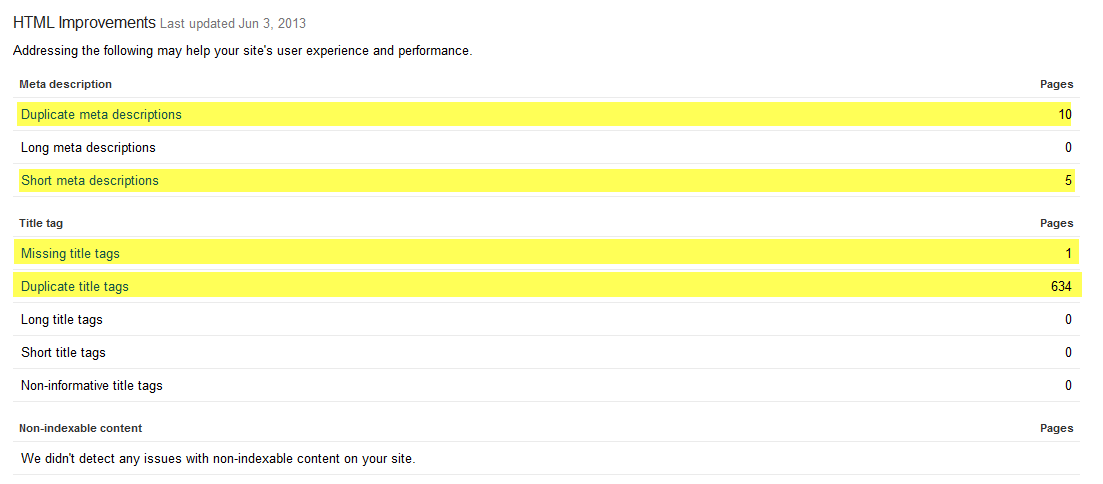6 Ways Google Webmaster Tools Can Improve Your SEO Strategy
Most search experts rely on Google Webmaster Tools (GWT) to analyze the technical aspects of a website. These experts focus on data like crawl stats, page errors and rich snippets. In addition to technical analysis, I recommend using GWT for basic on-page SEO improvements. Here are 6 easy ways to use Webmaster Tools to improve […]
Most search experts rely on Google Webmaster Tools (GWT) to analyze the technical aspects of a website. These experts focus on data like crawl stats, page errors and rich snippets.
In addition to technical analysis, I recommend using GWT for basic on-page SEO improvements. Here are 6 easy ways to use Webmaster Tools to improve your on-page SEO.
1. HTML Improvements
Under Search Appearance, you will find HTML Improvements. This report provides a snapshot of any issues with your site’s meta descriptions and title tags, along with a record of any content that isn’t indexable.
In the SEO world, we know that it’s important to have unique meta descriptions and optimized title tags. This report allows you to easily identify title tag/meta description issues and prioritize your efforts.
For example, in the screenshot above, you can see that 634 pages have a duplicate title tag. If I were to click on the “Duplicate title tags” link, I’d be taken to a screen listing all 634 pages, giving me a quick and easy way to identify page titles that need to be updated.
2. Content Keywords
Under Google Index, you’ll find Content Keywords. This tool allows you to determine not what you think your site is about, but how Google sees it.
It shows the keywords that are used on your site, along with keyword variations and significance. These data help you quickly determine if you need more content created around certain keywords, themes and topics. It also shows which pages the keywords appear on. Very helpful! (See the examples below; keywords were shaded out due to confidentiality.)
3. Structured Data
Structured data is a helpful way to explain the content of your website to the search engines — which can, in some cases, can help with rankings and traffic. If you have structured data on your site, GWT has a feature that shows the type of structured data that Google was able to detect on your site, along with the URLs containing each type. You can find this report under Search Appearance > Structured Data.
Note: This tool includes only the top-level entities discovered on a page. For example, if your page contains a schema.org/Event that in turn contains a schema.org/Place, only the Event item will be counted.
4. Data Markup Helper
Under Other Resources, the Structured Data Markup Helper allows you to tag the data fields for events, products and more on your site.
If you aren’t sure where to begin with structured markup, this is an easy to use point-and-click tool. The nice part about this is that HTML changes are not required. Your mouse highlights and tags each key piece of data on the appropriate page of your website.
5. Sitemaps
The Sitemaps section allows you to view all the sitemaps that you’ve added (or Google found) along with statistics such as the last date it was processed and the number of pages submitted and indexed. These stats can be viewed by content-type, meaning Web, video, images and news.
Another great feature is the sitemap test option; you provide the URL of a sitemap, and Google scans it, quickly detecting any errors that need to be fixed.
6. Removing URLs
If you need to remove a URL from Google’s index, you can use the Remove URLs feature in Webmaster Tools. This can be a very powerful tool, but use with caution! Only use this tool if you want to permanently remove a URL (as opposed to redirecting it).
Google gives a great example in their help section — if you have accidentally displayed confidential information such as a credit card number and you need to have a page removed, you can request expedited removal of the URLs. You will find this tool under “Google Index” in the left-hand navigation.
Webmaster Tools For Fast, Easy On-Page SEO Fixes
I find that these tools help me prioritize SEO improvement efforts and reduce analysis time. But these six features just scratch the surface of what Google Webmaster Tools has to offer. I encourage you to explore the ways in which GWT can help you implement an effective on-page SEO program.
Contributing authors are invited to create content for Search Engine Land and are chosen for their expertise and contribution to the search community. Our contributors work under the oversight of the editorial staff and contributions are checked for quality and relevance to our readers. The opinions they express are their own.
Related stories



